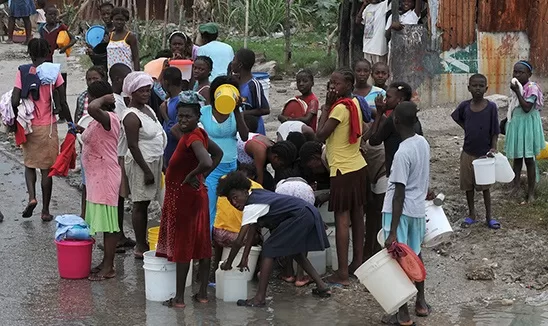In recent months, Nigeria has been grappling with a severe cholera outbreak,
leading to significant public health concerns and heightened attention from authorities and international organizations alike.
The National Center for Disease Control (NCDC) has been at the forefront of investigating this outbreak, aiming to uncover the root causes and implement effective strategies to curb its spread.
Read Also: Lagos Confirms 17 Cholera Cases, 15 Deaths
The findings and implications of the NCDC’s investigation shed light on the underlying factors contributing to the outbreak.
Understanding Cholera: A Persistent Threat
Cholera is a highly contagious bacterial infection that spreads through contaminated water and food. Its rapid onset of severe watery diarrhea and vomiting can lead to dehydration and, if untreated, death within hours.
Even with advancements in public health, areas like sections of Nigeria that have poor sanitation and little access to clean water continue to face the threat of cholera.
The Scope of the Outbreak
The current cholera outbreak in Nigeria has been unprecedented in scale and impact. Thousands of cases have been reported across multiple states, overwhelming local health infrastructure and resources.
The NCDC, in collaboration with international partners, initiated a comprehensive investigation to determine the factors fueling the outbreak and to formulate targeted response measures.
NCDC’s Investigation Unveiled

- Epidemiological Analysis: The NCDC conducted rigorous epidemiological studies to map the spread of cholera and identify high-risk areas. Patterns emerged, indicating clusters of cases in densely populated urban areas with poor sanitation facilities and limited access to clean water.
- Water and Sanitation Infrastructure: A critical finding of the investigation was the inadequate water and sanitation infrastructure in affected communities. Many areas lacked functional sewage systems, leading to the contamination of drinking water sources with cholera bacteria.
- Healthcare System Challenges: The outbreak strained local healthcare systems, with shortages of medical supplies, trained personnel, and treatment facilities exacerbating the crisis. The NCDC worked to bolster healthcare capacity in affected regions, deploying medical teams and supplies to support treatment efforts.
- Community Engagement and Education: Recognizing the role of community awareness in outbreak control, the NCDC intensified public health education campaigns.
- These initiatives aimed to educate communities on cholera prevention measures, including safe water handling, proper hygiene practices, and early recognition of symptoms.
Root Causes and Contributing Factors
Several underlying factors have contributed to the severity of the cholera outbreak in Nigeria:
- Poor Sanitation Practices: Widespread open defecation and improper waste disposal have contaminated water sources, facilitating the spread of cholera.
- Limited Access to Clean Water: Many communities lack access to safe drinking water, forcing residents to rely on contaminated sources.
- Urbanization and Population Density: Rapid urbanization has strained existing infrastructure, leading to overcrowding and inadequate sanitation in urban slums.
Climate and Environmental Factors: Seasonal changes, such prolonged rain or flooding, can make cholera more likely to spread by tainting water supplies and lowering standards of cleanliness.
Response and Mitigation Strategies
In response to the findings, the NCDC and its partners have implemented a multifaceted approach to mitigate the cholera outbreak:
- Enhanced Surveillance and Reporting: Strengthening disease surveillance systems to detect and respond to outbreaks promptly.
- Provision of Treatment and Supplies: Deploying medical teams, oral rehydration solutions, and antibiotics to treat cholera cases and prevent fatalities.
- Improving Water and Sanitation Infrastructure: Collaborating with local authorities to improve access to clean water and sanitation facilities in affected communities.
- Community Mobilization: Engaging community leaders and stakeholders to promote hygiene practices and facilitate behavior change towards cholera prevention.
Challenges and Future Considerations
Even with coordinated attempts, controlling the epidemic of cholera still poses a number of challenges.
- Resource Constraints: Limited funding and logistical challenges hinder the scale-up of response efforts and long-term interventions.
- Healthcare Access: Unequal access to healthcare services exacerbates the vulnerability of marginalized populations to cholera.
- Socioeconomic Determinants: For long-term cholera prevention and control, it is essential to address underlying socioeconomic issues, including inequality and poverty.
Conclusion
The cholera outbreak in Nigeria has underscored the urgent need for comprehensive public health interventions addressing water, sanitation, and healthcare system challenges.
The NCDC’s investigation has provided critical insights into the root causes of the outbreak, guiding targeted response efforts to mitigate its impact.
Moving forward, sustained investments in infrastructure, healthcare capacity, and community engagement are essential to prevent future outbreaks and improve health outcomes for all Nigerians.
Key Takeaways
- Cholera: is a highly contagious bacterial infection transmitted through contaminated water and food.
- NCDC: Leading the investigation into Nigeria’s cholera outbreak, identifying poor sanitation and limited clean water access as key drivers.
- Response: Enhanced surveillance, treatment provision, and community engagement are crucial for outbreak control.
- Challenges: Resource constraints and socioeconomic factors continue to pose challenges to effective cholera prevention and control.
By addressing these challenges holistically, Nigeria can make significant strides towards achieving sustainable development goals and ensuring the health and well-being of its population.



